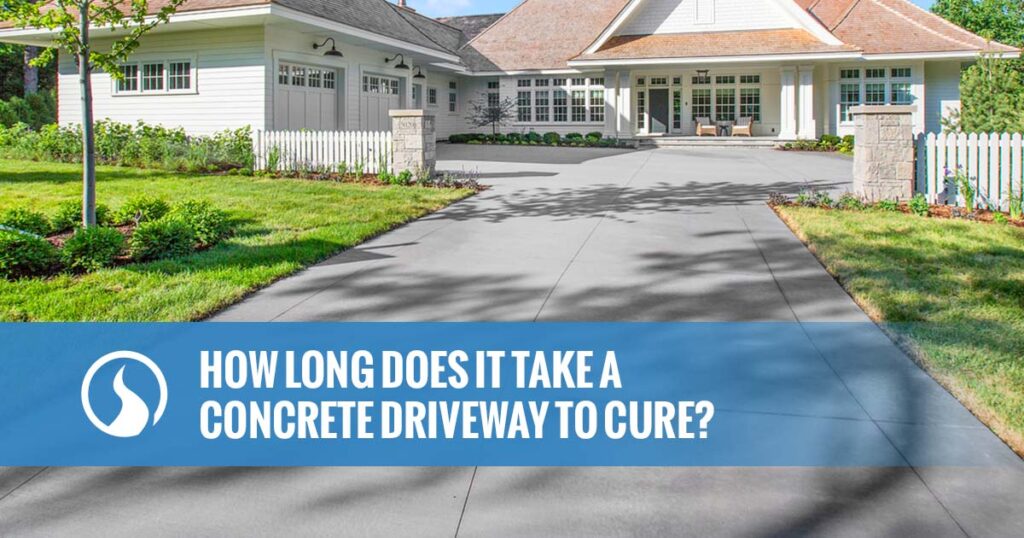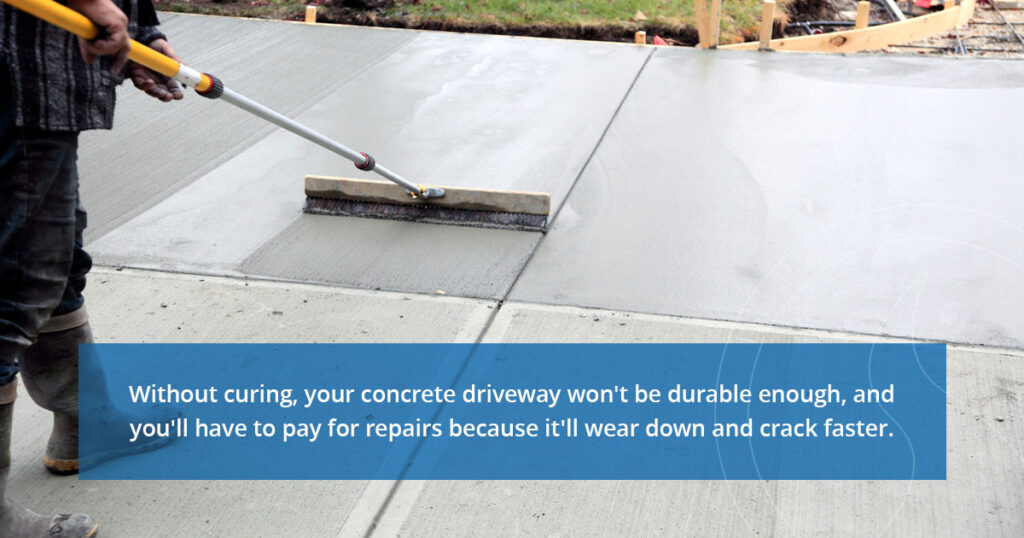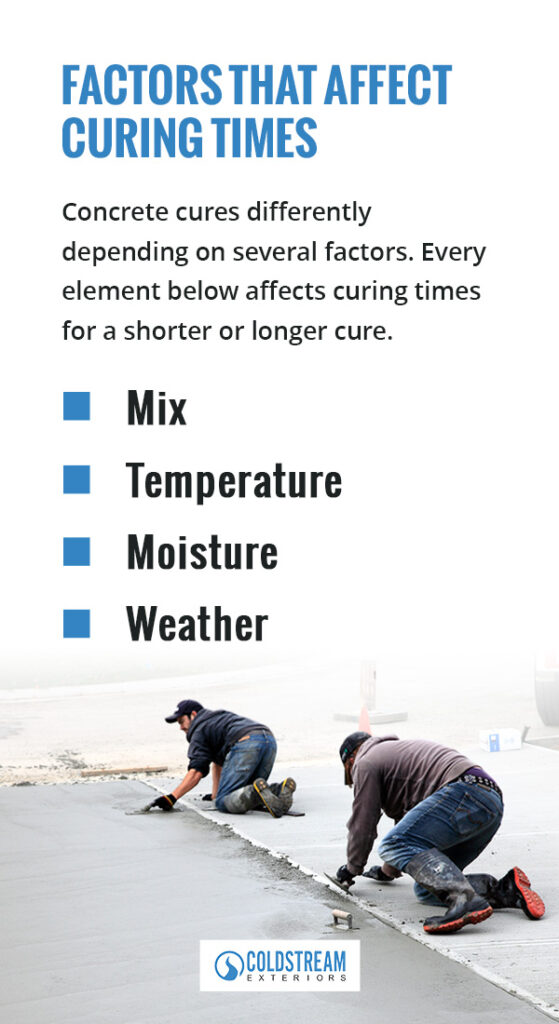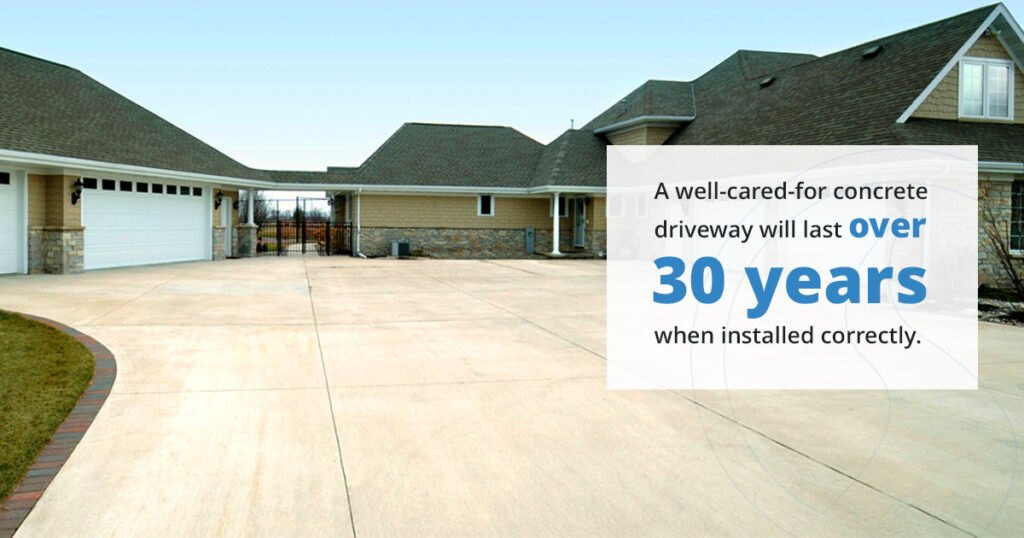How Long Does It Take a Concrete Driveway to Cure?

Concrete driveways are a popular choice for homeowners. The water resistance, durability and versatility of concrete create a sleek, strong design that can withstand years of heavy use. These advantages make concrete an excellent driveway material for your home.
One of the main downsides to a concrete driveway is curing times. Unlike other materials, you must wait several days after pouring concrete before using your new driveway. While this is a little inconvenient, the curing process is essential to preserving your concrete driveway’s strength and look.
Understanding how long it takes for a concrete driveway to cure and the basics of concrete driveways will help you know what to expect when installing a concrete driveway for your home.
What Is Concrete Curing?
Concrete becomes hard and durable once it’s set. Getting concrete to harden involves a chemical reaction between the cement mixture and water. Curing is the process of controlling the concrete’s moisture and temperature to ensure this reaction properly develops, and the concrete hardens correctly. Without careful controls during curing, your concrete driveway won’t be as strong as it should be.
Curing is different from drying concrete. Drying concrete involves getting its moisture content to the correct level for its intended use. In comparison, curing controls time, moisture and temperature to ensure the chemical reaction occurs correctly and the concrete is as solid as it needs to be for its intended use.

The Importance of Curing Your Concrete Driveway
Without curing, your concrete driveway won’t be durable enough, and you’ll have to pay for repairs because it’ll wear down and crack faster. As concrete cures, water is added to prevent the cement from drying out. If there’s not enough water, the temperature outside is too hot or cold, or it isn’t given enough time to cure, the concrete will dry out and crack. Improper curing makes the cement more fragile, leading to excessive strain on the driveway and causing faster wear and cracking.
You invest time and money into your concrete driveway — you want to ensure it lasts as long as possible to maximize your investment. Your driveway will withstand years of use and weathering with the right curing conditions. The better the curing, the stronger the driveway, and the less you have to worry about repairs.
Concrete Driveway Cure Time
Your concrete driveway should cure for at least three days. However, walking on your concrete driveway is often OK after 24 to 48 hours. This timeframe depends on the concrete, environmental conditions and the concrete company doing the work.
Walking on concrete after this period is usually safe — you won’t leave footprints or mark up the concrete. However, you should avoid using your vehicles on your driveway or using them more often than necessary during this period. The concrete is still curing and hasn’t yet reached its necessary compression strength.
Your exact concrete driveway cure time will depend on several factors, so talk to your driveway installer to ensure you leave your driveway alone for the appropriate amount of time.
How Long Is Each Stage of Driveway Curing?
Concrete curing is broken up into several stages. As the concrete hardens, it can withstand more and more pressure without issue. Concrete is never completely cured — the cement will continue to cure and harden over time. However, the concrete does reach a point in the curing process where it’s safe to drive over and walk on without issue.
Each curing stage takes time — follow your concrete installer’s instructions to help protect your driveway results.
1. Initial Stage
After placing and compacting the concrete, the initial curing stage begins. The initial period is when concrete is softest, so you should avoid walking or driving on your driveway. During this time, water will bleed from the concrete, rising to the surface. Once on the concrete’s surface, the water begins evaporating. Different methods are used to slow this evaporation process so the concrete begins curing correctly.
This stage lasts anywhere from one to three days. The exact initial stage length depends on your environment and concrete. If you walk on the concrete before the initial stage is over, you’re likely to leave footprints on the driveway.
2. Intermediate Stage
The intermediate stage is the middle part of curing. While the concrete is no longer soft enough to leave footprints on, it’s still not cured enough for vehicle use. The initial curing process happens rapidly but slows down after the third day. During this period, the concrete cures much more slowly.
The concrete usually takes seven days to reach its specified compression strength. Once seven days have passed, your concrete will have reached 70% of its specified compression strength. While it’ll still take time to hit 100%, 70% is safe enough for you to start using the driveway.
After the initial stage, foot traffic is allowed. Once the concrete cures for seven days, you can drive vehicles and equipment on it.
3. Final Stage
The final curing process takes much longer than the first two stages. After the intermediate stage, you can park your cars in your driveway again. However, the concrete driveway won’t be fully cured until 28 days have passed. While the concrete might continue to cure minimally after these 28 days, it’s as cured as it’ll ever be after the final stage.
If cured properly, your concrete should stay crack-free and withstand lots of wear and tear. Contact your concrete installer if you notice any issues following the final stage. You want to catch problems as early as possible to minimize their effects.

Factors That Affect Curing Times
While you can use rough times to estimate the curing process, your installer will be the one to give you exact curing times. Concrete cures differently depending on several factors. Each factor has to be controlled for — if they get too out of balance, it could interfere with the curing process. Every element below affects curing times for a shorter or longer cure.
Mix
Different concrete mixes have unique curing times based on chemical reactions in the mix. Some quick-dry concrete mixes dry much faster than standard formulas. However, the trade-off is weaker concrete after curing. Your installer will let you know how long their mix usually takes to cure.
Temperature
Temperature can speed up or slow down the curing process. Because installers need to get the evaporation rate during curing just right, the temperature can affect the process length. Too-hot days will evaporate the water too quickly, weakening the end result. While installers want warmer temperatures for optimal results, they need to watch out for overly-hot conditions.
Cold weather can drastically affect concrete curing. If the weather gets too cold, your installers won’t pour the concrete. Cold temperatures slow the chemical process down, which also weakens the concrete. Freezing temperatures shrink and expand the water inside the concrete, leading to driveway cracks. Slightly cold temperatures are doable but not ideal.
Moisture
Moisture has a significant impact on curing times and results. Without water, the chemical reaction that gives concrete its strength and form can’t occur. However, too much water or water that evaporates too quickly will affect curing results. If there isn’t enough water, the concrete will cure faster but won’t be strong — it’ll dry out and wear more quickly. Controlling moisture is essential for correct concrete curing times.
Weather
Weather plays into temperature and moisture. The concrete won’t form correctly if the weather begins interfering with curing. Excess humidity and rain can lead to too much water in the concrete. Strong winds might blow coverings off or lay debris onto uncured concrete.
Clear weather will stabilize curing conditions and reduce the chances of something happening to the concrete before it hardens. Spring or fall are usually good times for concrete driveway installations since the temperature and weather are more moderate, although summer can also work.
Driveway Care During Curing
The most important thing you can do for your driveway is follow your concrete professional’s instructions. Some installers require regular concrete wetting during curing, while others lay special coverings over the driveway. Following their instructions will help you get the best driveway results. You’ll enjoy using a sleek, durable driveway for years.
Following your professional’s instructions doesn’t just protect your driveway’s cure — it also helps protect you in case of any issues. Some installers will have warranties that cover driveway issues that pop up after installation. While these warranties are helpful, they’re only valid if you comply with all warranty instructions.
Depending on your installer’s concrete curing process, you might need to water the concrete with a hose multiple times a day. Watering keeps the concrete moist and prevents it from drying out too quickly. Others will have you leave the concrete alone — outdoor concrete installation conditions are mostly out of your control. The weather and temperature will make or break your driveway.
Finally, avoid driving overly-large vehicles or equipment on the driveway before it’s ready. Try to only park vehicles with even weight distributions on the driveway to keep everything even. Additionally, rotate where you park during the first couple of weeks so the concrete has the best chance of setting properly. Once you get the go-ahead, you can return to using your driveway normally.

How Long Does a Concrete Driveway Last?
A well-cared-for concrete driveway will last over 30 years when installed correctly. Your driveway’s life span will depend on the quality of the installation, concrete wear, environment and the curing process.
The more you use your driveway and the more stress it’s put under, the higher the risk of damage. However, concrete’s high durability makes it highly resistant to damage. Wear will occur with time, but your driveway will withstand years of stress before showing signs of strain.
How to Maintain Your Concrete Driveway
After completing the curing process, your concrete driveway will withstand heavy wear and tear easily. Properly-cured concrete is extremely durable and requires few repairs over the years.
Like all home features, it requires regular maintenance to keep it in top form. With the right care, your concrete driveway will last decades, and you’ll save yourself money on expensive repairs down the road.
Here are some ways to protect your investment:
- Clean your driveway: Avoid letting stains sit on your driveway. The longer they stay, the more permanent they become. Left-on stains will discolor your driveway and make it look older and more run-down. Pressure washing is an excellent way to clear dirt and stains off your driveway effectively.
- Avoid deicing: Concrete can get slippery after a freeze, but you should minimize your deicing agent use. Deicers can damage your concrete, leading to spalling and scaling. They force the moisture in your driveway to expand and contract, causing early cracks. While rock salt is slightly safer, it can harm metal and nearby vegetation. If you have to deice, use sand — it’s less abrasive and won’t harm your driveway or vegetation. To protect it, you should keep all deicing products away from your driveway during the first winter.
- Reapply sealer: Sealers create a protective finish. They keep your concrete looking new and guard it against early wear and tear. You’ll need to reseal every few years, depending on the vehicle traffic and weather your driveway experiences. Talk to your installer about recommended resealing schedules.
- Use care: While concrete is highly durable, it’ll wear down with too much time or force. Metal shovels can scrape and scratch the surface, damaging the sealer. Construction equipment and heavy vehicles can also wear down concrete’s support abilities faster. Use your driveway as recommended with care to expand its life span.

Contact Coldstream Exteriors for Home Exterior Construction Projects
Concrete driveways are just one exterior project that makes your home stand out. Upgrading your home’s exterior adds to its value, better protects your property and makes your home look like new. With 25 years of experience in roofing, Coldstream Exteriors is a trusted source of exterior home services for customers in the Greater Cincinnati area.
At Coldstream Exteriors, we put you first. We use only the highest-quality materials to ensure your home gets a lasting, attractive upgrade. With industry-leading warranties and unmatched customer service, you can get high-quality exterior work without stress. Finding a reliable roofing company helps protect you and your home from damage and keeps your household safe.
If you’re looking for professional roofing, gutter, siding or window services, schedule your free inspection today!
